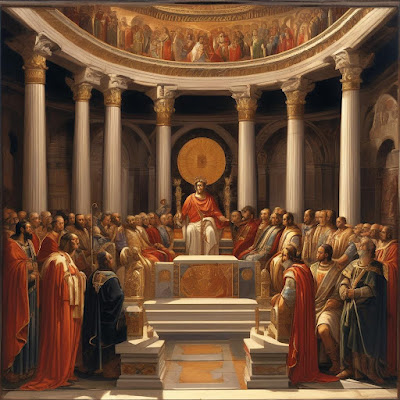Stop the Lies About Pope Francis and Mary
A Catholic’s Response
I am disgusted with the bigoted anti-Catholic vitriol being spewed recently by some non-Catholic so-called "Christians," accusing Pope Francis of rejecting Jesus and claiming he’s in Hell because he "entrusted" himself to Mary.
You don't like the Catholic Church or the Pope — I get it.
You don’t understand Catholic teaching, culture, or terminology — I get it.
But at the very least, show basic human decency. Pope Francis has just passed away. He has just been buried. At least respect the man’s death before you start spewing ignorant, bigoted tripe again.
I can’t believe I even have to explain this, but here we are.
Let me break it down clearly, from a Catholic who actually knows what we believe.
What It Means to "Entrust" Yourself to Mary
When Catholics "entrust" ourselves to Mary — like Pope Francis did many times in his life, and at his death — we are not rejecting Christ.
We are asking Mary, the Mother of God, to help us love and follow Jesus even more faithfully.
We’re following what Scripture shows: Mary always points us to Christ.
Catechism of the Catholic Church (CCC 970) says:
"Mary's function as mother of men in no way obscures or diminishes this unique mediation of Christ, but rather shows its power."
Pope Paul VI in Marialis Cultus (1974) made it clear:
"The Church’s devotion to the Blessed Virgin is intrinsic to Christian worship, but it is always directed to the greater glory of Christ."
We don’t worship Mary. We don’t adore her.
We venerate her — because she magnifies the Lord (Luke 1:46). She doesn't compete with Him.
But Isn't Christ the Only Mediator?
Absolutely.
Catholics fully believe what Scripture says: "There is one mediator between God and men, the man Christ Jesus" (1 Timothy 2:5).
But that doesn’t mean we can't pray for each other or ask for others’ prayers.
If you’ve ever asked a friend to "pray for me," you already believe in subordinate mediation.
St. Thomas Aquinas explained this perfectly:
"Christ alone is the perfect mediator between God and man... But others are called mediators in a secondary sense, insofar as they cooperate in uniting men to God by preparing or disposing them for union with Him." (Summa Theologiae, III, q. 26, a. 1)
Mary’s intercession doesn’t replace Jesus.
It brings us closer to Him.
The Second Vatican Council's Lumen Gentium hammered this point home:
"Mary’s maternal function towards men in no way obscures or diminishes the unique mediation of Christ, but rather shows its power." (Lumen Gentium 60)
No confusion. No competition. Just deeper union with Christ.
Is It Idolatry or Paganism?
No. Not even close.
Idolatry means worshipping something or someone as God. Catholics absolutely do not and cannot worship Mary.
We venerate her because God chose her in a unique way. We honor the masterpiece because of the Artist.
The early Christians knew this.
St. Irenaeus (2nd century) said Mary was "the cause of salvation for herself and the whole human race" (Against Heresies, Book III, Ch. 22) — because she said yes to God’s plan, not because she saved anyone on her own.
St. Cyril of Jerusalem (c. 350 AD) told the early Church to ask the saints for prayers,
"praying that God will receive our petition through their prayers." (Catechetical Lectures 23:9)
If asking the saints for prayers is paganism, then the early Church was pagan — which is nonsense.
Is Pope Francis in Hell Because of Mary?
Seriously?
No human being — no YouTube commentator, no preacher, no Twitter troll — can declare someone in Hell. Only God judges souls (CCC 1038).
Besides, entrusting yourself to Mary is not a sin, much less a mortal sin. It’s a sign of humility and faith in God’s plan.
When Pope Francis entrusted himself to Mary, he was doing what Christians have done for two thousand years: asking a holy mother to pray for him as he followed her Son.
At his 2013 entrustment to Our Lady of Fatima, Pope Francis said:
"We entrust ourselves to you, Mother of the Church, that we may be taught to follow Christ with greater fidelity."
Not “instead of Christ.” Follow Christ.
To spread the lie that Pope Francis is in Hell because of that is not only ignorant — it’s vicious, and it reveals a heart very far from Christian charity.
Final Word
Catholics entrust themselves to Mary because she leads us straight to Christ. Always has. Always will.
We don't replace Jesus.
We don't worship Mary.
We ask her to pray with us and for us.
And when someone — even a Pope — dies, we pray for them, honor their memory, and leave their soul in God’s merciful hands.
That’s what real Christians do.
Appendix: Sources and References
-
Catechism of the Catholic Church, paragraphs 963–975
-
Pope Paul VI, Marialis Cultus (1974)
-
Second Vatican Council, Lumen Gentium, Chapter 8
-
St. Thomas Aquinas, Summa Theologiae, III, q. 26
-
St. Irenaeus, Against Heresies, Book III, Ch. 22
-
St. Cyril of Jerusalem, Catechetical Lectures 23
-
Pope Francis, Prayer of Entrustment to Mary, 2013
-
St. Ephrem the Syrian, Hymns on the Nativity








.jfif)

.jfif)


.png)